#sacrificial scholar
Photo

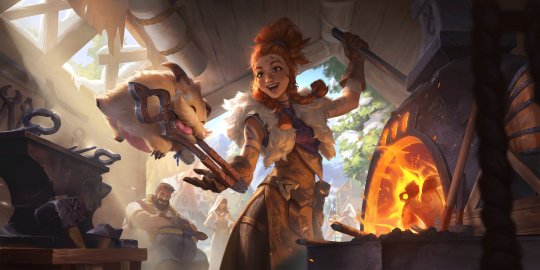

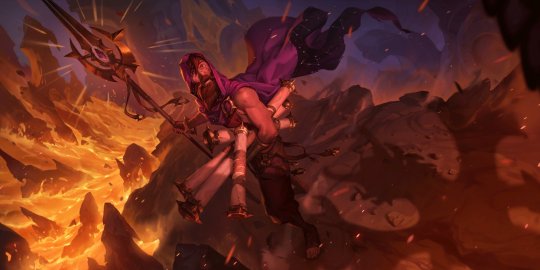

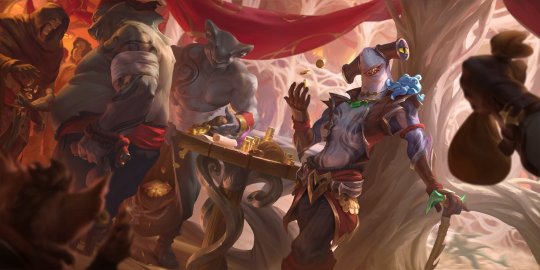
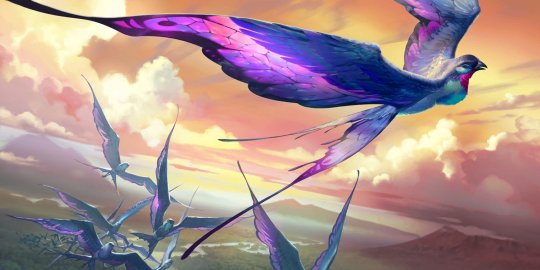

Legends of Runeterra May 2023 Expansion
Captain Indari - Innovative Blacksmith - Grave Companion - Sacrificial Scholar - Beguiling Cobra - Perfidious Promoter - Royal Shimmerwing - Altar to Unity
#legends of runeterra#legends of runeterra card#captain indari#innovative blacksmith#grave companion#sacrificial scholar#beguiling cobra#perfidious promoter#royal shimmerwing#altar to unity#official
96 notes
·
View notes
Text

Sacrificial Scholar by Envar Studio
7 notes
·
View notes
Text
.
#*for the muse#*for the piano#*for love#*for the angel#*for the savior#*for the fire#*for the scholar#*for the star#*for the omen#*for dogma#*for the fragile#*for the summer moon#*for the revenant#*for the recluse#*my reflection#*the usurper#*sacrificial dagger#*the void#🔋🦊#illumin tag
0 notes
Text
making a new character...
#i will be making another one after her to be her girlfriend because its fun to have little couples to draw about but i need to get done -#- with this one first#her name is monique weaver shes a wizard scholar she spent her first stages of life in a library of a home and she acts cold but truly is -#- extremely nice and self-sacrificial#🌙rambling
0 notes
Text

"Homecoming,"
In this scene, of Aeschylus's Greek tragic play "Agamemnon", King Agamemnon has finally arrived back to his palace in Argos (Mycenea) after conquering Troy. He arrives in a chariot with his spoil of war; CASSANDRA (a Trojan slave girl cursed by Apollo with the power of prophecy - but that none shall believe her visions).
Agamemnon's wife, CLYTEMNESTRA meets them at the palace doors, obstructing his entrance. (The chorus has previously related the tale of Agamemnon sacrificing his daughter, Iphigenia, ten years prior on the way to Troy. So this confrontation is eagerly anticipated). She showers her husband with rhetoric of love and respect, then rolls out fine embroidered cloth (with fragile red dye) and then convinces him that only by walking barefoot on the tapestry will he prove his high worth and placate her to enter.
Professor Peter meineck, in his "Modern Scholar" audio lecture series: "Greek Drama", points to the symbolism when he says "...Agamemnon is wading through blood of his sacrificed daughter," and "...trampling the wealth of the house." Professor Meienck also thinks this tapestry is a menstrual image representing Clytemnestra's power (he even mentions that the ancient Greek word for door was also a slang word for vagina). So when Agamemnon relents, he unknowingly goes to his death. He now represents the sacrificial bull of the Greek new year "Buphonia" Festival.
Random Fun fact: this scene in this play is where we get the concept of "rolling out the red carpet" for honored guests.
Want to own my Illustrated Greek myth book jam packed with over 130 illustrations like this? Please support my kickstarter for my book "lockett Illustrated: Greek Gods and Heroes" coming in October.You can also sign up for my free email newsletter. please check my LINKTREE
#pagan#hellenism#greek mythology#tagamemnon#mythology tag#percyjackson#dark academia#greek#greekmyths#classical literature#percy jackon and the olympians#pjo#homer#iliad#classics#mythologyart#art#artists on tumblr#odyssey#literature#ancientworld#ancienthistory#ancient civilizations#ancientgreece#olympians#greekgods#agamemnon#troy#trojanwar
2K notes
·
View notes
Text
But Germany’s performances of repentance have their limits. They do not extend, for example, to the genocide the German colonial army committed in Namibia against Herero and Nama people between 1904 and 1908, killing tens of thousands. Germany did not officially apologize for those bloody acts until 2021 and has not agreed to pay meaningful reparations to descendants of the victims. If the new German identity relies on isolating the Holocaust as a shameful aberration in national history and nullifying it via solemn remembrance, there is little room for the memory of colonial violence in the nation’s self-mythology. Genocide scholar Dirk Moses named this approach the “German catechism” in a 2021 essay that sparked heated debate. “The catechism implies a redemptive story in which the sacrifice of Jews in the Holocaust by Nazis is the premise for the Federal Republic’s legitimacy,” wrote Moses. “That is why the Holocaust is more than an important historical event. It is a sacred trauma that cannot be contaminated by profane ones—meaning non-Jewish victims and other genocides—that would vitiate its sacrificial function.”
Accordingly, Germany now sees its post-Holocaust mandate as encompassing not a broader commitment against racism and violence but a specific fealty to a certain Jewish political formation: the State of Israel. Germany has relied on its close diplomatic relationship to Israel to emphasize its repudiation of Nazism, but its connection to the Jewish state goes even further. In 2008, then-chancellor Angela Merkel addressed the Israeli Knesset to declare that ensuring Israel’s security was part of Germany’s “Staatsraison,” the state’s very reason for existence. If asked why it is worth preserving a German nationalism that produced Auschwitz, Germany now has a pleasing, historically symmetrical answer—it exists to support the Jewish state.
To that end, in recent years, Germany’s laudable apparatus for public cultural funding has been used as a tool for enacting a 2019 Bundestag resolution declaring that the Boycott, Divestment, and Sanctions (BDS) movement targeting Israel is antisemitic. Although the resolution is technically nonbinding, its passage has led to an unending stream of firings and event cancellations, and to the effective blacklisting of distinguished academics, cultural workers, artists, and journalists for offenses like inviting a renowned scholar of postcolonialism to speak, tweeting criticism of the Bundestag resolution, or having attended a Palestinian solidarity rally in one’s youth. A network of antisemitism commissioners—a system explored in this issue in a feature by Peter Kuras—has been deputized to monitor such offenses. These commissioners are typically white, Christian Germans, who speak in the name of the Jews and often playact Jewishness on a public stage, posing for photo ops in yarmulkes, performing Jewish music, wearing the uniform of the Israeli police, and issuing decrees on who is next in the pillory. When they tangle with left-wing Jews in Germany, canceling their events and attacking them as antisemites in the pages of various newspapers, they suggest what Germany’s antisemitism commissioner Felix Klein has said directly: That the Jews are not being sensitive enough to what antisemitism means to the Germans—that, in fact, these Jews do not understand antisemitism at all. In a perverse twist, the fact that the Germans were the most successful antisemites in history has here become a credential. By becoming the Jews’ consummate protectors, Germans have so thoroughly absorbed the moral lessons bestowed by Jewish martyrdom that they have no more need for the Jew except as symbol; by the logic of this strange supersessionism, Germans have become the new Jews. This is not only a matter of rhetorical authority on Jewish matters but is also often literal, as this self-reflexive philosemitism has led to a wave of German converts to Judaism. According to Tzuberi, “The Jewish revival is desired precisely because it is a German revival.”
If Jews are negated by this formulation, Palestinians are villainized by it. Last year, when the German state banned Nakba Day demonstrations, only days after the murder of Palestinian journalist Shireen Abu Akleh, police justified this suppression by claiming, in a familiar racist trope, that protesters would not have been able to contain their violent rage. Indeed, in Germany Palestinian identity itself has become a marker of antisemitism, scarcely to be spoken aloud—even as the country is home to the largest Palestinian community in Europe, with a population of around 100,000. “Whenever I would mention that I was Palestinian, my teachers were outraged and said that I should refer to [Palestinians] as Jordanian,” one Palestinian German woman speaking of her secondary school education told the reporter Hebh Jamal. Palestinianness as such has thus been stricken from German public life. In The Moral Triangle, a 2020 anthropological study of Palestinian and Israeli communities in Germany by Sa’ed Atshan and Katharina Galor, many Palestinians interviewed said that to speak of pain or trauma they’ve experienced due to Israeli policy is to destroy their own futures in Germany. “The Palestinian collective body is inscribed as ontologically antisemitic until proven otherwise. Palestinians, in this sense, are collateral damage of the intensifying German wish for purification from antisemitism,” wrote Tzuberi.
July 5, 2023
249 notes
·
View notes
Note
Not to mention if he had shown Tang, a scholar who lived and breathed JTTW, his memories... I'm pretty sure Tabg would have straight up attacked him for trying to describe what happened to Wukong while he was held captive by Heaven had been anything less than what it was: Torture. For example, at this point, Sun Wukong is more than a fairytale or storybook character. He's more than just some demon who lived thousands of years ago as a footnote in a history book. He's a person, not only that, but he's someone who has since become part of Tang's family! He's a flawed but still wise master who is impulsively self sacrificial to the point of unintentionally hurting the people who care about him, he's temperamental and tends to be forgetful about the limits of normal mortals because he's never had a baseline, he's petty, but ultimately... Sun Wukong is someone who cares deeply and honestly about the people who manage to get past the ironclad walls he has erected around his heart, someone who is selfless at heart even when his actions seem selfish, someone who has had a very difficult life and is still learning to let other in and trust them. Tanghas read Wukong's story a hundred times over, analyzed his written actions a thousand times, out of everyone he is probably the one who knows the ksot about Wukong's past besides the Demon Bull King and Macaque, the person who pribavly raised Wukong the most besides the Sentinels and his mate respectively. He recognizes how much Wukong has changed for the better, how he's still learning after all these centuries, and how he's trying so very hard to be a good mentor for MK and teach him the lessons he never had so he doesn't suffer the same way he did even while his own past comes back to bite him.
So no... Tang would absolutely be offended by Azure's narrative
YUP. referencing.
Tang about to bust out his Bachelors in ancient Chinese history and literature to poke a million holes in Azure Lion's whiteashed narrative:

(In the Scroll of Memory as Azure is showing his memories of the Rebellion):
Tang, suddenly appearing in the memory: "Where is Erlang Shen?"
Azure, startled: "How did you get in here?"
Tang: "As someone who lives for this era in history - I can poke so many holes in your story. Sun Wukong was strong enough for the Jade Emperor, but fell to his nephew Erlang Shen, his Plum Hill Lads, and Lao Tzu's binding ring. From there he was tossed into the Trigram Furnace and was forced to endure 49 days of the Samadhi Fire to extract his immortalities."
Azure, pleasantly impressed: "You know your stories well monk-"
Tang, interupting: "AND-! I am not finished. The great Tang Monk, aka Tripitaka, did not yield to the Taoist gods! Only to the Buddha and his diciples! To call him an Agent of the Oppressors greatly overlooks how many times he helped his fellow mortals, even at the threat of being executed for his faith!"
Azure: "You're becoming overwhelmed-"
Tang, angry tears: "And I know Wukong! He wouldn't have targeted you guys at Camel Ridge unless you did something warranting his anger! How can you call him a traitor when YOU left him to burn!?"
(*Azure's memories dispate, instead showing Wukong when he was with the Pilgrims - from the perspective of Tripitaka. Wukong is laughing along with his brothers Zhu Bajie, Sha Wujing, and Ao Lie*)
Tang, volume increasing: "Wukong didn't stay with the Pilgrims to hurt people. He stayed because he knew that his mind and emotions needed healing after such a tremendous amount of pain. They cared enough for him to address this pain and help him towards being a true sage. Something your *Brotherhood* obviously never bothered to do! HE DIDN'T BETRAY YOU AS MUCH AS YOU BETRAYED HIM!!"
(the memory scroll completely disapates back to reality. the entire MKrew + the Brotherhood are staring shocked at Tang's show of power*)
Tang: *breathing heavily and angry crying*
MK, wide-eyed and impressed: "...whoa"
Pigsy, proud: "Yup. Don't try to twist what happened back then Azure. My Tangy knows his history."
Peng, whispers to the others: "The Golden Cicada lives on. I knew I wasn't mistaken."
Yellow Tusk: "I suggest we retreat for now. Once the Celestial Realm senses our escape, they are sure to have increased their defences."
Azure, eyes narrowing: "No. We go forward with our plan. No matter what this monk-"
Tang: "I'M NOT A MONK!"
Tang: *casts Magic Missile*
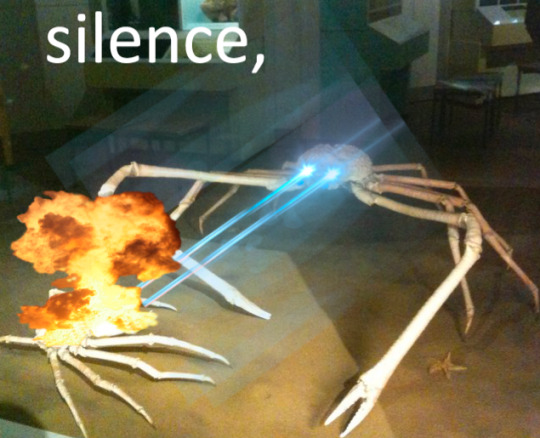
Because at the end of the day, Azure understimated the receipts that Wukong's new dad-friend would have on their political movement.
#lmk theories#lmk tang#lmk azure lion#jttw#journey to the west#lmk the brotherhood#lmk yellow tusk elephant#lmk golden winged peng#lmk#lego monkie kid#lmk s4 spoilers
45 notes
·
View notes
Note
were there at all household private cults and prayer to the gods? or was it all done in nature with the community?
very fun question - and as with most things regarding pre-christian slavic beliefs, complex to answer!
short answer: from archeological and ethnographic research, we can say with considerable confidence that spiritual beliefs for pre-christian slavs permeated every aspect of life, and so basically every place; there were both personal religious rituals and responsibilities, as well as those of the given community as a whole.
now, for a longer answer under the cut, let's start with a great quote from good old Gieysztor:
The corners of the house and homestead, the field, no man's land, and no man's waters, forests, mountains, and clouds were all inhabited by beings proper to them, who received the worship they deserved, that is, appropriate offerings and prayers made in the house and in the yard, in the field and at the crossroads, by the springs, by rivers and lakes, at the foot of trees of peculiar kinds and ages, by the stones and rocks, in the very mountains.
due to the scarcity and nature of the sources we have (so, for example, usually medieval christian chronicles) and the way folk culture absorbs new religions while retaining a plethora of very old beliefs often leading to the lines between them getting blurred, we have to remember that we are working within a framework of the most probable explanation - and rarely a 100% certainty. while I know that most of you here are well aware of that, I like to bring it up again from time to time.
for a long time there was great debate among the scholars of slavic beliefs about whether any sort of separate sacred space was ever present - like temples, for example, with devotional items and the separate social function of priests, and other standard religious structures. but then, as further research was conducted, it became clear that slavs had both this smaller, personal idea of a cult of gods and spirits, as well as a greater communal one, oftentimes reinforced by the presence of oracles, priests, or members of the community specifically dedicated to leading rituals and sacrificial feasts.
when it comes to this private idea of venerating deities (and spirits, and ancestors) by an individual or, by extent, a family within one household - while we know it must have existed, and in more form than one, as anthropology, folk oral culture, and comparative studies assure us - we are presented with two main obstacles making this study more difficult.
one, chronicles and other great sources for quite obvious reasons will focus mostly on greater events - festivals, communal celebrations, temples, and other religious behaviours that could have been experienced or observed by a stranger, or be worthy enough of relaying to strangers.
two, bigger objects such as statues or ritual stones, are much easier to be identified as ones of religious importance. with small objects found on sites of typical households it becomes more difficult to ascertain whether the figurine or clay vessel could have been a part of an altar - or whether it was just an object of everyday use, a toy, or an ornament. if any of you are into archaeology to any degree, you'll know exactly what that struggle is. and then, many personal objects, let's call them, could have had magical meaning and use - but not necessarily a religious one, as oftentimes magic was seen as separate from dealing with deities.
many prayers were simply forgotten, some turned into folk songs or spells, others got absorbed by the new religion and lost their original agency - and so, for prayer specifically, it is rather hard to know how it might have truly worked for pre-christian slavs.
still, both historically and in the contemporary context - when we speak of reconstructive paganism - while the communal cult was and is a crucial vital part, the personal, individual worship plays a part just as meaningful.
114 notes
·
View notes
Text
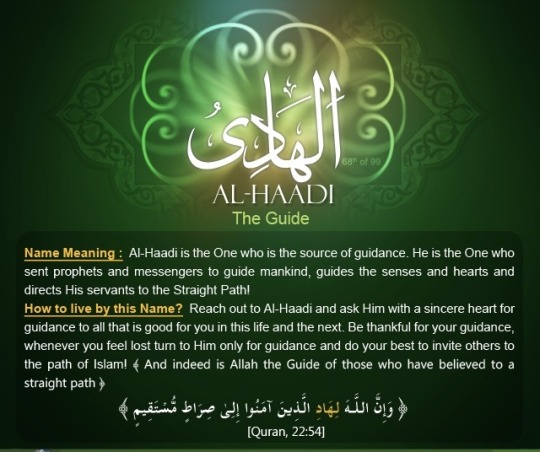
Allah calls Himself Al-Haadi— The Guide— on two occasions in the Quran. He is the one who gives perfect guidance. Al-Haadi is the one by whom His believers are guided and by whose general guidance all creatures are guided to what is beneficial for them!
The One who guides, The Guide of the right path
Al-Haadi comes from the root haa-daal-yaa which points to two main meanings. The first main meaning is to guide aright or to lead the right way. The second main meaning is to show with kindness the proper way and to guide in the right path until reaching the goal.
This root appears 316 times in the Quran in twelve derived forms. Examples of these forms are al-hudaa (the guidance), yahdee (guide), hadiyyatin (gift), al-hadyi (sacrificial animal), and al-muhtadeen (the guided ones).
Linguistically, hadaa is the verb which means to guide, and hidaayah doesn’t just mean guidance; it also refers to guiding in a gentle and kind way. Referring to Allah ‘azza wa jall, He is the only true guide by whom the creatures are guided. Al-Haadi created signs in the universe to guide us, such as the stars and the moon, as well as the spiritual guidance of hearts to the truth and the physical guidance of the senses we use to detect harm.
Al-Haadi Himself says: And indeed is Allah the Guide of those who have believed to a straight path [Quran, 22:54] … And thus have We made for every prophet an enemy from among the criminals. But sufficient is your Lord as a guide and a helper. [Quran, 25:31]
Four types of guidance
Scholars divide the guidance of Allah ‘azza wa jall into four different types. The first is hidaayat-al-a’mmah or general guidance, which is in place for the whole creation including plants, minerals, animals, etcetera; all are guided by Al-Haadi in the best manner for them. An example are the bees and how they work, the migrating of birds, the suckling of a newborn, the working of the senses. He said, Our Lord is He who gave each thing its form and then guided [it]. [Quran, 20:50]
The second type is described as hidaayat-al-Jinn-wal-Ins; it is guidance for the jinn and mankind defining the paths of good and evil, through the prophets and messengers sent by Allah ‘azza wa jall. And indeed, [O Muhammad], you guide to a straight path. [Quran, 42:52]
The third type of hidaayah is by tawfeeq (ability) and inspiration (or ilham). An example is when you are guided through a hardship and you display strong trust and belief in Al-Haadi: No disaster strikes except by permission of Allah. And whoever believes in Allah– He will guide his heart . . . [Quran, 64:11] Then there are those incidents when you end up at the right place, hearing something you just needed to hear or meeting someone just at the right moment, all as forms of guidance of Allah.
And the forth type is guidance to success in the Hereafter for the righteous believers: And We will have removed whatever is within their breasts of resentment, [while] flowing beneath them are rivers. And they will say, Praise to Allah, who has guided us to this. [Quran 7:43]
How Can You Live by This Name?
1. Keep asking for guidance.
If you seek the truth sincerely, Al-Haadi will guide you to it. As a believer, you say, a minimum of seventeen times a day when you pray: ihdinas siraatal mustaqeem– guide us on the straight path. Why, while you are already guided to Islam, should you keep asking for guidance? Because there are different levels of guidance for you to attain to be truly guided and because you are in need of continuous hidaayah; realize no one is safe from misguidance.
2. Feel it when you say ihdinas siraatal mustaqeem.
These are levels of true guidance: guidance of knowledge to know the truth, the capacity to be guided, to desire to be guided, to act upon it, and to remain steadfast in it. For all obstructions that impede guidance to be removed and to be granted sight of your ultimate goal along the path. For you to be aware of your own desperate need for guidance from Allah ‘azza wa jall over any other necessities and to make you see the misguided paths [ summarized from Ibn al Qayyim al Jawziyyah] So next time you say ‘Guide us on the straight path’, say it with feelings, sincerely asking to attain all levels of guidance from Allah.
3. Seek guidance from Al-Haadi in each matter.
Whenever you feel lost, stuck or when you have to make a decision, turn to Allah ‘azza wa jall before turning to others. Asking for guidance, you can use this beautiful name, e.g. by starting your invocation with Yaa Haadi. Whatever guidance someone or something might give you, know that it truly comes from Al-Haadi. A means to seek hidaayah is to pray the sunnah istakhaarah prayer.
4. Be thankful and do good to increase your guidance.
In Paradise you will say: . . . and we would never have been guided if Allah had not guided us. [Quran, 7:43] Reflect how hidaayah (guidance) is the best hadiyyah (gift) you can ever get, so thank Allah ‘azza wa jall for it each day. Indeed, We guided him to the way, be he grateful or be he ungrateful. [Quran, 76:3]
Another benefit of thanking Him for guidance is that He will give you more: . . . If you are grateful, I will surely increase you [in favor]. [Quran, 14:7] Also, your good deeds are directly linked to your guidance, so the more good deeds you do, the more Al-Haadi will increase your guidance: And Allah increases those who were guided, in guidance, and the enduring good deeds are better to your Lord for reward and better for recourse. [Quran, 19:76]
5. Invite others to the right path.
Invite others to the straight path, first and foremost by showing exemplary behaviour yourself. However, know that true guidance is from Al-Haadi. This should increase you in your confidence in calling others to Islam, as you know that the results are not dependant on your da’wah or speech but are in the hands of Al-Haadi; so don’t get disheartened or arrogant: Indeed, [O Muhammad], you do not guide whom you like, but Allah guides whom He wills . . . [Quran, 28:56]
Ask Al-Haadi.
A beautiful supplication the Prophet salallahu ‘alayhi wa sallam used to beg Al-Haadi with was:
يَامُقَلِّبَالْقُلُوبِثَبِّتْقَلْبِىعَلَىدِينِكَ – Yaa muqalib al quloob, thabbit qalbee ‘alaa deenik, which means: O Turner of the hearts, turn my heart towards your deen. [At-Tirmidhee]
O Allah, Al-Haadi, we know that You are the ultimate Guide. Guide us on the straight path and make us of those who keep asking sincerely for your guidance in every matter. Inspire us to be aware and thankful for Your Guidance and aware of those who desire it. Aid us in inviting others to Islam and bless us with the ultimate guidance we need to enter Your Paradise, ameen!
#allah#islam#revert help team#asma al husna#revert help#muslim#ayat#daily#allah’s name#dua#pray#prayer#salah#muslimah#hijab#religion#reminder#mohammed#new muslim#new revert#new convert#how to convert islam#convert help#convert islam#become a muslim#welcome to islam#how to convert to islam#daily ayat#prophet#god
16 notes
·
View notes
Note
Okay, now it is YOUR turn to talk about what your Laurence's (eventual?) vices/flaws are! There is a general theme of Laurence having good intentions but growing corrupt, but at the same time something's always unique and all. I reckon yours is an impulsive and arrogant asshole of sorts, but what else / how can it be elaborated?
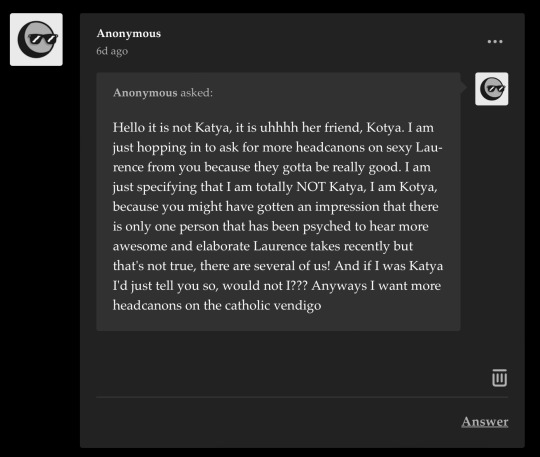
OH INDEED.
Fucking Kotya lmao
Ok, so…I drew this pic literally to answer these asks, because I figured a portrait of young Laurence looking all ✨ambitious✨ would suit the whole thing, so here.
Free art for u
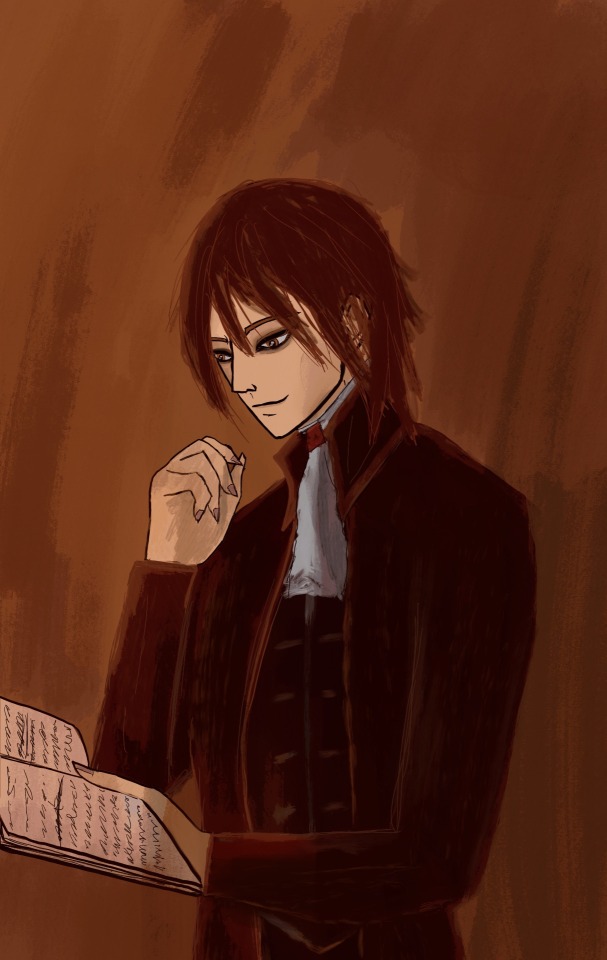
I am now recieving reports that he looks like Light Yagami from Deathnote even though I have only seen a few pictures of Light in my life and I also totally drew inspiration for this design from a totally different character but ANYWAY
Lol. Ok, now for the headcanons!
My Laurence is pretty straightforward. He has rich kid with a chronic illness syndrome. That’s it. Bam. (I’m kdding. Kind of).
In all seriousness, from day one I saw Laurence as someone that was born into wealth and into a different lifestyle from most people. That’s why the “he’s from Cainhurst” thing was perfect for me, because yeah, of course he is. He comes off like that. (I’ll get to the chronic illness thing).
I’m not just going on some “billionaires can be careless individuals that wreck people’s lives because they can’t fathom being poor or desperate or barred from certain privileges” rant…but I am acknowledging what I see as one of Laurence’s biggest issues, and that’s…well…he’s too reckless with human life. I don’t even think it’s entirely sinister or intentional, but he simply doesn’t get it. He thinks he can treat the world like a lab experiment and everything will be just fine.
(This is also why I think Micolash was more deprived as a child, because he’s sacrificial with human life in a more deliberate way. He’s desperate as hell and is willing to brutalize countless people to reach the top. That urge and drive to even reach a higher plane just screams “lack” to me. Micolash wanted to claw his way out of the slums, but I won’t go into that now and if anyone dares suggest I am saying that less privileged people are more cutthroat, I am NOT. This applies to a very specific type of bastard ffs 💀).
Oh and, since we are not just going over flaws in light of me answering both your asks, I will give more detail on my headcanons for Laurie’s background. After all, it also ties into the flaws discussion.
—
Bakckground 🔱
So. For some background context, I headcanon that Laurence’s father was, in fact, That Guy we always point out (Beltran) on the portraits and for the same reasons you do.

Credit to you for the reference obviously, but that pendant…the Cainhurst/Yharnam/Healing Church links…well, yeah. We know.
Anyway, so Beltran was a pretty famous Cainhurst academic professor and research expert on the Pthumerian genetics of the Cains in particular. (When I say I think Cainhurst was full of experimental scholars around the time Byrgenwerth was founded, I am dead serious. I SWEAR IT MAKES SENSE. Byrgenwerth and Cainhurst. Two sides of the same coin, my friend.)
Anyway, Beltran was married to a non-royal but wealthy lady from Hemwick that descended from a Loranite family that happened to be full of priests and seers. Yippeee!
This couple’s only child was Laurence, and he was raised in their oh-so-fancy rich lifestyle where the father was constantly being invited to snobby scholarly events and the mother was holding tea-centered socials in their lavish mansion parlors. Like ya do.
I picture Laurence growing up trying to fit in with his parents’ lifestyle like this:
Lmao, so long story short…it wasn’t his thing. He didn’t quite vibe with the snobby richies he grew up with.
In fact, I like the idea that he absolutely hated his parents’ high class world and felt that they expected too much from him. He was too restricted and stifled. They expected him to be them. His mother was strict, disapproving and nagging; his father was absent-minded and a bit too focused on his life’s work, which, when he wasn’t lost in, was the only thing he tried to connect with Laurence on.
“You should be a great scholar too, Laurence!! Uh hur hur.”
This is where Laurence started to rebel and go his own route, while also developing plenty of complexes along the way (of course). He would be a better academic, better influential figure, better leader, better plutocratic socialite, etc., oh yes. His parents would see.
He had all the makings of these things too, because despite bucking against his childhood influences, he was ,quite frankly, obsessed with enriching study, scientific pursuit, old mythologies and religions, etc.. He loved the world of academia. He was fond of the ancient tales of glorious heroes and scholars that changed the world for the better, and he often fancied himself one of those “types.”
I even like the idea that he discovered the (Bloodborne equivalent) tale of of Saint Laurence the Martyr and saw it as a sign that he was destined for greatness. He tended to reference lofty epics and historical novels in everyday discussion to add a sense of meaning and grandeur to everything. He didn’t want to live a common, mundane life. He wanted to live a glorious one.
And one of the key contributing factors to this mindset Laurence had was his own chronic illness.
Now, this is my favorite thing to headcanon actually because it fits so well??
As a child, Laurence developed early on what I consider to be Cystic Fibrosis, and had horrible lung issues for most of his life. When he was young, the doctors told him and his parents that his life expectancy was likely to be about 30 years. (In the real world, this was actually the life expectancy not too long ago).

Knowing this, and being disappointed in his doctors for not providing any sort of cure, was the catalyst for half of Laurence’s ambitions. He only had so much time to live life, and he was determined to leave his mark on the world…and maybe also find a cure. Yasss bestie!!
—
Byrgenwerth 🍎
Laurence’s parents sent him off to Byrgenwerth at 16 to gain an intense and long-term education from Yharnam’s leading scholars. He went with Ludwig, a childhood friend.
A bit on my Laurence/Ludwig headcanon to add context:
The two had both grown up somewhere near Hemwick, and while Laurence lived in a more isolated, wealthy world, Ludwig was a sturdy farm boy that had helped to keep his family’s ranch afloat after losing their larger fortune. While they had come from Cainhurst in previous generations, family chains of bad habits and broken ties led to a lower class lifestyle for Ludwig’s parents.

Laurence personally knew that Ludwig was a primary caretaker for his parents and many siblings. He was a good, loyal kid, and it was through him that Laurence learned empathy for people with less fortune than himself. I mean, Ludwig would drag Laurence around to visit neighbors and even donate to those that were struggling with money like it was nothing, and I think this is where Laurence started to “feel” for the rest of the world.
Unfortunately, his arrogant streak also tainted it with a sense of, “See! Look how good of a person I am!”
(I think Ludwig did have an impact on him though, so it was always a mix of self-righteousness and a genuine desire to help others. He would have also admired Ludwig and secretly envied his…dead-honest heart for those in need).
Ok. Going back to the storyline, and considering this bond that Laurence and Ludwig shared, here we have them at Byrgenwerth. Laurence was already planning his great ascension into glory and sleepy Ludwig is just happy to be there with his friend and to have been lucky enough to even attend by the graces of a family friend. Yipeee!

My Laurence was at his most fiery and impetuous at Byrgenwerth as a young teen/young adult. He was passionate, talkative, charismatic, fierce, etc., and he made quick work of getting to know everyone in the school right away. They couldn’t escape him. To Laurence, every other student was a potential ally and “part” in the epic tale of his life.
(This was also when Laurence and Ludwig met Gehrman, who was basically Byrgenwerth’s most well-known “security guard” when it came to warding off beasts or general supernatural weirdness. Gehrman was this odd, older kid in his 20s with an insane skillset. He was already an infamous hunter and Laurence greatly admired his bravery. He and Ludwig sought out the antisocial weirdo that was always hiding in the woods and adopted him into their friend group. Aaaand that’s where all the trouble began lol).
Soon, everyone in Byrgenwerth held some kind of connection to Laurence. Rom, Micolash, Maria, Caryll, Damian, Yurie, etc., and they all had their own thoughts and feelings on the brash auburn scholar. He was a handful to be sure. In a way, Ludwig was the only one that could ever “hold Laurence back” a bit, but only in a very brotherly, good-natured manner.
That’s the thing too; people liked Laurence a lot. He was popular, but they could also hate him or grow tired of him. He knew how to be charming and how to talk others up by pointing out their strengths, but then he could turn around and be so arrogant, self-centered, and envious that it would irk his audience.
They wanted to be apart of the grand tale he was telling them that he planned to weave, but they also wanted him to just shut up sometimes; if that makes sense. He was a bit of an endearing, irritating, egoist with a lot of outward appeal and an inward intrigue.
His true friends also knew that he was secretly very insecure around people he didn’t trust or know, and would be vulnerable on occasion with those he did trust. That bit of heart he could show is what proved to his friends that he wasn’t actually a total impulsive snob. He cared. He just also wanted to prove himself to the world and literally everyone in it.
“I swear, you guys don’t realize how important I am to the modern age yet!!”

After years of studying and researching his beloved histories and mythologies, he began to take an interest in medical science, archeology, and the mysterious history Yharnam had with Pthumerians.
His illness also grew worse as his thirties approached. He began to study directly under Provost Willem, and that’s when the board was set with all the right pieces.
—
The Church and Research Hall 💉
Ah, here we go.
I think, for obvious reasons at this point, Laurence’s interest in the ancient records of the Pthumerians and their superhuman traits was to be expected. It was exactly what he was looking for.
Divine blood? A link between gods and men? Ascension? It all seemed like the earth-shattering discoveries he had dreamt of all his life; it seemed like the dream of changing the world for the better, making an impact, and even the subtle hope of finding a cure for chronic illness. Needless to say, Laurence was fixated. Willem was right there with him.
Laurence was an assistant professor to Willem by that point and they began to experiment with all of our lovely blood and eyes in the Research Hall. I love the thought you have expressed before about testing antidotes during that stage as well; something Laurence would have been interested in.
Laurence, with all his bright ideas, was the one to suggest a Church as a way to distribute and test their research. Willem agreed, and that’s where our beta Healing Church began. Laurence wasn’t really a religious person himself, but Yharnam thrived on it and he was smart enough to know that religious authority was absolutely an asset, one that he could peacefully utilize to spread his influence and agendas.
He knew Yharnam had always believed in the Great Ones, and discovering a holy medium to use as proof of their interference was everything they needed.
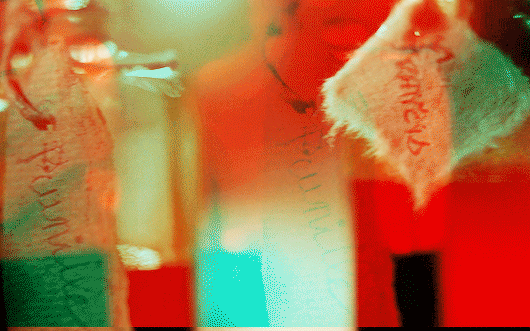
Now, moving on with the lore implications that we have discovered about Byrgenwerth and the Church having been united at one point, AND the subsequent schism having been more of an internal divergence within that union rather than the precedent to a direct, dramatic academic/religious split…let’s jump ahead a bit…
Post-Fishing Hamlet and Byrgenwerth schism Laurence was someone a little more cold and cutthroat. He was still impulsive, but his spitfire characteristics were tamer, more subdued…he had taken up the authority of the Healing Church, reluctantly separated from Willem, and dealt with the aftermath of the Fishing Hamlet—something he absolutely felt guilt over, but was too afraid to acknowledge. He hid everything. All that mattered was what the blood could give him.
There was also a new burning drive in his heart upon reaching his thirties, which he had never expected to see. The blood had seemingly lessened the effects of his Fibrosis and acted as a temporary cure. It was his salvation and the salvation of Yharnam. Totally. 100%
Nothing will go wrong.
—
Yharnam’s Downfall 🩸
We know how things went down from here, but Laurence by this point was, I guess you could say, at his lowest and worst. The mistakes he had made in his earlier years with the Hamlet, the Schism, and the Research Hall were catching up to him, and as Yharnam began to gradually grow worse under the blood ministration, Laurence grew worse with it.
In the public eye, he was a gracious and holy figure that distributed alms and medicines to those in need, who endlessly made promises he probably wouldn’t keep, but everyone that believed him would be dead before they even understood that. Behind closed doors, things were different.
He was harsher with his colleagues, heavily depressed, and more desperate than ever. His illness was like a reoccurring nightmare; something that reared its ugly head in the worst moments and sent him into darker, more hellish states of mind. He suppressed it every time, taking more and more blood to heal himself, but he wasn’t stupid. (I think?)
He knew that the blood wasn’t working the way he thought it was supposed to. It was temporary, brief, fleeting…and if anything, it affected his pscyhe for the worse. He was becoming more paranoid, more withdrawn and bitter. Like a solitary beast. (Omg foreshadowing!)
Most of his old friends either left him, betrayed him directly, or simply tolerated him from that point on. Gehrman was too miserable in those days to draw close to anyone, and Ludwig himself was sinking deeper into self-loathing and disillusionment. Willem was gone, Rom was doing Rom things, Yurie and Caryll were gone…Micolash had become somewhat of a monster, and Maria was strongly opposed to most of what Laurence stood for.

He had lost most of the old ties that had saturated his Byrgenwerth days, and needless to say, it took its toll. This is when Brador came into the picture, but you remember that whole headcanon I’m sure ;)
This is when all bets were off. Laurence was angry, grieved, condemned, and vengeful. Bro went ballistic.
He ordered the Cainhurst massacre, he allowed more unethical experiments in the Church walls, he tolerated the mistreatment of certain people groups in Yharnam, and eventually he oversaw the burning of Old Yharnam. He hid most of his sins too, hiring assassins and spies to take care of any prying eyes.
This was the ruthless, cruel Laurence that the fandom loves, but I don’t personally see him as having been gloating or laughing through it. I think he was giving himself to hatred and self-hatred, abusing his public image to allow a certain amount of “justified” mercilessness. I also can absolutely see him being paranoid out of his mind.
His former desires to appear as a heroic figure were twisted into these evil decisions as Vicar, but there was also a side to his determination that was fueled by the notion of “If this world is going to be so unfair and unkind, I’ll wrest order from it, I’ll bring us to glory if it kills us.”
This was his true downfall. BAD LAURENCE. BAD.
The End 🔥

Yharnam was ruined.
Broken down, defeated, and heartsick…Laurence had lost everything. Cainhurst was gone, Hemwick lay in ruins, Old Yharnam’s people were given to the plague, and every old friend Laurence had known had fallen into darkness. Ludwig was dead, Maria was dead, Willem was in a vegetative state, Rom had ascended, Caryll was dead, and Micolash had lost his mind in Yahar’gul.
I also have this theory that not long before the time of his transformation, Laurence discovered that his mother had been living in Cainhurst when the massacre had taken place. His father had died years earlier, and he had not exactly been devastated considering he barely knew the man, but Laurence’s mother, for all of her cold-heartedness, had been a relevant presence in his life. Knowing that he had been the cause of her death threw him into despair and even further regret.
His sickness also finally came through despite all the blood consumption. Blood itself was something Laurence began to regularly cough up as his lungs ruptured. He was going to die soon and he knew it. He was also possibly on the verge of something worse. The bestial taints of his flesh were omens he could not ignore.
That’s when Laurence finally shattered and accepted his fate. He had achieved…a lot. None of it good. Brador pitilessly remarked that nobody would consider him a good man even after his death, and Laurence lamented the dream he once had of dying in a sacrificial, heroic death in flames like the ancient Saint Laurence had done.
The greatest sacrifice he could make was to die, and spare the world from any further ruin, Brador said. He would never be a saint, but he could still die a martyr’s death. An ironic, perverse variation of one.
Laurence’s final action was to summon the Moon in a last-ditch effort to gain Flora’s help, to help the heart-broken Gehrman bring Maria back, to plead for mercy and freedom from the curse of beasts. Laurence promised Gehrman that they would fix everything, that it would all be made well if the Hunt continued. Gehrman believed in Laurence and the promise, but the latter did not. He knew it was over.
The Moon descended, Gehrman vanished into the Dream, Old Yharnam burned, and Laurence turned at last, accepting his demise. Brador finished him off with fire and blood, beheading him afterwards and wearing his scalp as a twisted symbol forever after. Laurence was in his fifties and had truly died a grand martyr’s death. He got everything he wanted. Yipeee!
—
THERE I DID IT! Damn, I am glad you made me do this, because even though I always really liked Laurence, I never quite loved him. I hadn’t done the character deep-dive yet, but this?? This did it.
I love the reckless, spitfire teen/young adult Laurence of Byrgenwerth, the kid that wanted so badly to prove himself to the world and change things for the better, who wanted to trump his own lifelong illness, and who wanted to be better than the people that raised him. He was arrogant yes, but he was admirable to others in his sheer force of will to succeed and conquer life. I love the idea that he wanted his life to be like an epic, full of heroism and sacrifice.
I don’t think he ever initially used people, and I don’t think he lacked empathy. He had learned it from his friends and from simply observing the world. Yes, he was insecure and envious of others that seemed better than him, but he also vocally expressed genuine support and encouragement on their behalf. They were characters in the story too! They had valuable parts to play! (Oh the irony).
Yes, he was careless with human life. He was simply ignorant as a youth because of his upbringing wherein the “elite” were the ones that decided the fate of others. That carelessness turned sinister only in his later years when he began to lose sympathy for the world. Yes, he made a grave mistake in that.
But there was always remorse. Laurence’s heart was not buried. He regretted every needless death, every failed experiment. He may not have admitted it until just before his death, but he was never entirely without shame. Guilt wasn’t something the heroes in his favorite tales were supposed to feel.
I love all of the symbolism that can permeate his character as well. Blood in health and illness, the forbidden fruit that is dangled to lure men into beasthood, the antlers he carries as a beast, which are symbolic of a glorious crown in most interpretations, etc..
Just how he burns with hellfire, wearing this ironic crown, a sign of his perfectly orchestrated downfall. It’s beautiful.
I love him. You made me love him by writing about him. Congrats lol. Hope this answered all your questions about his flaws and the headcanons!!
Au revoir!

#I DID IT FINALLYYYYY#WOOHOO!!#this felt great#i love this character now like officially#it took a while to click but i see it now…i get it fandom#i wish things were…a little different in the neighborhood and everyone could share without feeling judged but anyway i won’t go into that#hope you like it Katy and that it was worth the wait!!#:D#laurence the first vicar#bloodborne#bloodborne headcanons#CrowSketch#long post#gif warning#asks
23 notes
·
View notes
Text
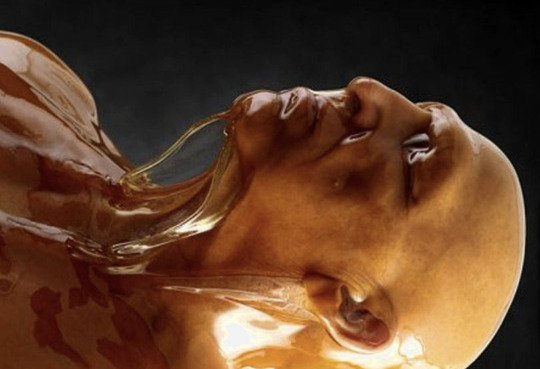
Mellified Man
The "Mellified Man" article describes a unique and bizarre practice that reportedly occurred in ancient China and was documented by the Arabic physician and writer, Ibn al-Nafis. According to the account, elderly men in certain remote communities would volunteer to undergo a special process after their death to transform themselves into a medicinal substance known as "mellified man."
The process involved the individual consuming only honey until death. After their passing, their body would be sealed in a honey-filled coffin for a period of approximately 100 years. The resulting honey, said to have healing properties, would be used as medicine or as an ingredient in medical treatments.
The article discusses the historical context and cultural beliefs surrounding the mellified man practice, which was considered a self-sacrificial act for the betterment of society. It highlights the rarity of documented cases and notes that the authenticity and extent of this practice remain a subject of debate among scholars.
Please note that the concept of the mellified man is considered unusual and falls outside the realm of conventional medical practices. It represents a unique cultural belief and historical phenomenon that may be viewed as strange or unconventional from a contemporary perspective.
Read more
#Mellified Man#wikipedia#weird facts#weird history#strange facts#strange history#random fact#weird wikipedia#wikiweird#history#medical#medical history
42 notes
·
View notes
Text
15 Days of Freyja Devotion
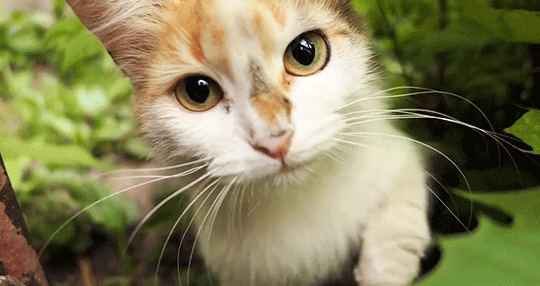
Day 7: Offerings -- Historical & UPG
Freyja's historical offerings include:
Pork was a common offering for all of the Vanir, but especially Freyja and Freyr. (I personally do not offer meat to the gods unless I can find meat that was ethically slaughtered, but I know pork is still a common offering for other modern Heathens.)
Horses were also a common sacrificial animal in Old Norse society, and Freyja probably received them as offerings.
Ale, mead, and other drinks were commonly poured out for the gods, including Freyja. There is some evidence that Freyja was invoked in a toast over the couple's first drink together at Norse weddings.
Jewelry. Sacrificing jewelry by throwing it into a lake was a common Norse offering practice. As a goddess of wealth, Freyja would have welcomed offerings of fine jewelry, such as gold torcs. (I have an amber necklace dedicated to Freyja that I wear to feel connected to her.)
Weapons were sacrificed in the same way as jewelry, and Freyja may have received some of these sacrifices as a goddess of battle.
Spinning tools may have been offered to Freyja and/or Frigg. Tools were another common votive offering, and both Freyja and Frigg are associated with spinning. These tools may have been offered when asking the goddess(es) for help in domestic matters.
Human sacrifices? I would be cherry-picking if I didn't include this. The Norse did practice human sacrifice (though from what I understand it was uncommon), and some scholars believe Freyja may have received human sacrifices, especially sacrifices of kings or princes, but there isn't enough evidence to say for sure.
Some of the modern offerings I personally give Freyja are:
Apples or apple cider because of her association with apples in Swedish folklore.
Wine and sparkling wine, especially sweet wines with a lot of fruit notes. I find she is especially fond of sparkling rosé.
Coffee or tea. I like to make coffee for the gods the same way I would for a friend who is visiting. I find Freyja enjoys coffee with lots of cream and sugar and chamomile tea.
Flowers are one of my favorite springtime offerings. I like to use flowers from my own garden when I can, but I have also bought her bouquets.
Taking care of cats is another way I honor Freyja. Any time I encounter a stray cat, I check to make sure they aren't injured or sick, and if thy need medical attention, I try to capture them so I can either treat minor wounds myself or take them to the vet. (I am an experienced animal rescuer. Do not do this if you are inexperienced.) I also leave out food for stray cats in my neighborhood. If a cat repeatedly comes to my house and seems friendly and social, I adopt them. (This is how I got both of the cats I've had as an adult.)
Donating money to appropriate charities or nonprofits. I see Freyja very much as a goddess of bodily autonomy, so I have donated in her name to Planned Parenthood and NARAL Pro-Choice America as an offering before. I also try to support local organizations that do free STI testing and prevention. I work at a nonprofit that serves survivors of sexual assault, and I see this as Freyja's work as well.
A serving at my holiday feasts. I like to make a plate for any appropriate deities when I celebrate holy days. I make a plate of whatever I've cooked for me and my family and leave it on their altar.
#15 days of freyja devotion#15 days of deity devotion#freyja#freyja deity#freyja goddess#norse heathen#norse heathenry#inclusive heathenry#heathenry#heathen#pro-choice#violence tw#deity work#mine
52 notes
·
View notes
Text
Maybe the right way to go isn't to call Jews "Holocaust deniers" for saying "the Nazis persecuted LGBTQ people, but it wasn't the Holocaust. The Holocaust was specifically the Jewish experience, and the word was chosen from a Greek translation of Temple-era Jewish sacrificial practices. For other genocides and persecutions, Porajmos was the Roma experience, Aktion T4 was the disabled experience, and the LGBTQ experience was something different."
In academia, people have argued whether it's appropriate to refer to the non-Jewish experience in the camps as "the Holocaust." It's a small detail, but also an important one, because different groups DID NOT have the same experience in the camps. Either way, it's a debate that is largely being held in good faith. Different Jewish scholars fall on different sides of it, and have done so historically.
My plan is that I will probably stop using the word "Holocaust" where possible. I will probably start using Shoah instead of Holocaust when I'm talking about the Jewish experience, and "Nazi genocides" when I'm talking about the overarching Nazi treatment of different groups. "Holocaust" is too likely to be misunderstood, and it was always an insulting term anyway, acting like the Shoah was equivalent to Jewish sacrificial practices in the days of the Temple.
96 notes
·
View notes
Note
OKAY SO the doom part is pretty obvious (being born sorta just to die, being the sacrificial lamb for the entire human race)
heir would tie in to the fact his Entire Existence was leading up to his death. its kinda all he was
also in the sense of Changing Doom and Suffering (healing people, reviving people iirc, coming back to life himself)
also doom in the sense of Changing Limits- opening heaven to humanity via clearing them of sin through his own Sacrifice- granting them access to Unlimited peace
also doom in the sense of Acceptance (ties in to Limits) - you know whats gonna happen and you make peace with it. jesus never really tried to run, he knew what it meant when judas kissed him he just kinda like. dealt with it.
also Heir of Death in the sense of actually literally dying (and managing to change the suffering of others While He Was Doing That, with the two other guys on crosses next to him iirc, and one of them being. idk repented is that the word)
i am, admittedly, not a scholar on Religious Things so i could be just fucking Wrong but i Am pretty good with classpecting. i hope. ive got like a 75% success rate (also i feel like itd tie in with the potential life-bound mary through the concept of Sacrifice (Life) and Being a Sacrifice (Doom). though ofc The Public can debate you do your thing im Sorry if i sounded forceful or an ass in that other ask btw im just like! freaking out)
decently cut-and-dry i think
(also could be heir of hope as the literal manifestation of Hope for Humanity and Faith itself, if you vibe with that)
im obsessed with you. i love this. thank you.
8 notes
·
View notes
Note
In two to three sentences, write a brief elevator pitch, or synopsis, to get someone interested in your character! Ideally, an elevator pitch is said within 30 seconds, the length of an elevator ride. Use this opportunity to summarize the best of your muse's story, without giving too much away! Get the "audience" hooked!
colin: moderately antagonistic archeologist who loves music. ideal for fellow music-lovers, unnecessarily smart people, or folks who have seedy dealings. a little manipulative, a lot closed off. has a cool robot arm.
fai: cheerful -- possibly bordering on annoying -- mage who doesn't use magic. ideal for fellow mages, moons in need of a sun, or equally energetic fellows who want to terrorize the grumpy ones. frontrunner for world's tragic-est backstory; his smile hides multitudes. (also easy for crossovers, as his story involves jumping around worlds.)
ukitake: old, powerful shinigami known best for his kindness. ideal for folks who need a dad and/or grandpa figure, fellow old souls, or anyone who needs someone to talk to. has the wisdom of thousands of years of life, and a constitution worse than your sickliest victorian boy.
kurama: former infamous fox thief, current Super Normal Human Guy, incredibly complex individual. ideal for fellow demons, young spiritualists in need of a mentor, or antagonists in need of a strong rival. somewhere between kind, loving, and absolutely brutal.
light: world's first democratically-elected gay man; host to a truly incredible amount of disabilities. two-time death game survivor. ideal for fellow kinda-psychics, folks interested in participating in harrowing death games, and other deeply traumatized individuals. will infodump at you.
richeh: quiet apprentice witch with a dislike for change. ideal for muses in need of a daughter or little sister, fellow spellcasters, and people whose idea of hanging out is sitting in a room & ignoring each other. very much the creative, artistic type.
rita: child prodigy, mage, scholar. orphan with zero socials skills, and no interest in sharpening those skills when she could be researching instead. ideal for muses who can dish it and take it, adventurers, and folks in need of a little sister who isn't afraid to set them on fire. very spiky on the outside -- beware.
sanji: cook, pirate, lover of women. proud owner of not one, but two tragic backstories. ideal for muses who enjoy eating, guys who like to fight, and pretty much anyone in between. will flirt with you. frontrunner for world's most self-sacrificial man.
sasha: superstar psychic secret agent who has green skin & wears sunglasses at night. ideal for psychics in need of a mentor & runaway children. very stern and guarded on the outside, but really just A Guy on the inside.
simon: ex-con prosecutor with a very rough exterior -- literally and metaphorically. ideal for suns in need of a moon, crime-adjacent muses, and folks with an interest in psychology. will do absolutely anything for the people he loves -- including but not limited to getting himself executed.
toya: street singer & soft boy extraordinaire who struggles to emote due to a very stifled upbringing. ideal for particularly energetic muses, musicians, and students in need of a tutor. very good at arcade games -- will win you a prize from the claw machine. will win you several prizes, actually.
yukito: world's gentlest man & alter ego of moon guardian yue. entirely unaware of the second thing. ideal for rough-around-the-edges folks, anyone in need of family, and sports teams in need of an extra player. somehow both incredibly observant and incredibly oblivious all at once.
8 notes
·
View notes
Note
I hope you don’t mind me asking this, but can you explain who Carlo is? Saw you mention the name a few times and got curious…
I don't mind at all, Nonny...I adore Carlo and will take any opportunity to blather about him 💕 Spoilers for Silvio's route behind the cut:
Carlo is Silvio's...not quite valet, not quite servant. His employee and his trusted right hand man, although Silvio would swear otherwise until he was blue in the face. Carlo is a scholar and man of science, with his studies focused on nautical navigation. He's been Silvio's assistant for many many years now, ever since Silvio found him being bullied down by the shipyard and rescued him. Recognizing Carlo's intellect, Silvio hired him and he's been with him ever since, accompanying Silvio on voyages at sea and assisting him where he can in exchange for his research being funded.
Carlo is loyal and speaks Silvio-ese fairly fluently by this point, although he's a somewhat shy and reticent man and therefore easily cowed by Silvio's tyranny. But when push comes to shove he has spine enough to stand up to his boss, and is quick to call out injustice directed towards Silvio and come to his defense. When Silvio tries to do anything stupidly self-sacrificial, it's Carlo who will be sticking by him and trying to talk his boss out of it. It's also Carlo that gets incredibly indignant over how the king treats Silvio and what Rio doesn't know about Silvio's efforts on his behalf...and he insists, no matter how much Silvio protests, that Silvio is a good man.
Carlo will show up in Rio's route and in Silvio's, where he'll feature most heavily in the dramatic end and in the both-endings bonus story.
44 notes
·
View notes